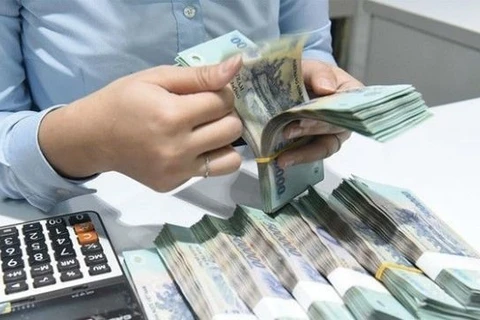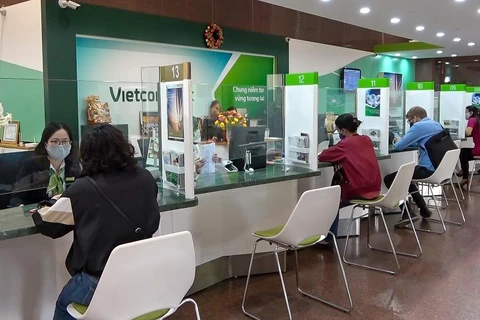Hanoi (VNS/VNA) - Though some banks increased their deposit interest rates early this month, it is not a common trend and the rate currently is still at the lowest level it has been in many years.
With the liquidity of the banking system abundant and interest rates on the interbank market still at a low level, some banks unexpectedly increased their rates at the beginning of March.
Techcombank has applied higher savings interest rates of 0.5-0.6 percentage points for many terms since March 1. Specifically, the rates for six-month and 12-month deposits rose to 4.4-4.7 percent and 5.1-5.4 percent per year, respectively.
VPBank also listed new deposit rates for individual customers from March 2, with rises from 0.2 percentage points for terms less than six months.
At ACB, the two- and three-month deposit rates were also increased by 0.1 percentage point.
Despite these movies, in general, the deposit interest rates at most other banks haven’t changed much compared to last month and remain at a low level.
The rates were kept unchanged from the previous month among State-owned commercial banks including Vietcombank, Vietinbank, BIDV and Agribank, and in the group of joint-stock commercial banks such as LienVietPostBank, SeABank and TPBank.
Several other banks even decreased their rates. At BacABank, for example, the rates for one-month to five-month deposits fell by 0.2 percentage points to 3.6 percent per year while six-month to 12-month deposits also saw declining rates of 0.3 percentage points.
SCB also reduced the rate by 0.5 percentage points for 12-month deposits to 6.8 percent per year.
According to experts, there is not much room to further reduce savings interest rates as banks must ensure real positive interest rates compared to inflation to attract depositors.
They explained while the inflation rate has been increasing since the first months of this year, demand for credit is also forecast to surge rapidly this year when the economy recovers. Interest rates will likely increase as a result.
KB Vietnam Securities Company said the interbank interest rate and Government bond yields are hitting the bottom while the deposit interest rate is also dropping to the lowest level in the past 15 years. The company forecast the interest rate level is likely to bottom out in the first half of 2021 and increase slightly again in the second half of 2021.
Vo Tri Thanh, a member of the National Financial and Monetary Policy Advisory Council, said it was very difficult to further lower interest rates because economic recovery will lead to an increase in demand for credit.
The management of monetary policy this year must be very flexible, Thanh noted, adding if the monetary policy was too tight, it could hamper the economic recovery; but vice versa, if the policy is too loose, the country would face financial risks and high inflation.
Financial risks have been seen in recent months when many investors spent on securities and real estate instead of depositing at banks due to low interest rates, Thanh said, adding it was best to maintain the interest rate level.
Though there were no signs of a bubble currently, Thanh warned it could occur if interest rates were cut further./.
With the liquidity of the banking system abundant and interest rates on the interbank market still at a low level, some banks unexpectedly increased their rates at the beginning of March.
Techcombank has applied higher savings interest rates of 0.5-0.6 percentage points for many terms since March 1. Specifically, the rates for six-month and 12-month deposits rose to 4.4-4.7 percent and 5.1-5.4 percent per year, respectively.
VPBank also listed new deposit rates for individual customers from March 2, with rises from 0.2 percentage points for terms less than six months.
At ACB, the two- and three-month deposit rates were also increased by 0.1 percentage point.
Despite these movies, in general, the deposit interest rates at most other banks haven’t changed much compared to last month and remain at a low level.
The rates were kept unchanged from the previous month among State-owned commercial banks including Vietcombank, Vietinbank, BIDV and Agribank, and in the group of joint-stock commercial banks such as LienVietPostBank, SeABank and TPBank.
Several other banks even decreased their rates. At BacABank, for example, the rates for one-month to five-month deposits fell by 0.2 percentage points to 3.6 percent per year while six-month to 12-month deposits also saw declining rates of 0.3 percentage points.
SCB also reduced the rate by 0.5 percentage points for 12-month deposits to 6.8 percent per year.
According to experts, there is not much room to further reduce savings interest rates as banks must ensure real positive interest rates compared to inflation to attract depositors.
They explained while the inflation rate has been increasing since the first months of this year, demand for credit is also forecast to surge rapidly this year when the economy recovers. Interest rates will likely increase as a result.
KB Vietnam Securities Company said the interbank interest rate and Government bond yields are hitting the bottom while the deposit interest rate is also dropping to the lowest level in the past 15 years. The company forecast the interest rate level is likely to bottom out in the first half of 2021 and increase slightly again in the second half of 2021.
Vo Tri Thanh, a member of the National Financial and Monetary Policy Advisory Council, said it was very difficult to further lower interest rates because economic recovery will lead to an increase in demand for credit.
The management of monetary policy this year must be very flexible, Thanh noted, adding if the monetary policy was too tight, it could hamper the economic recovery; but vice versa, if the policy is too loose, the country would face financial risks and high inflation.
Financial risks have been seen in recent months when many investors spent on securities and real estate instead of depositing at banks due to low interest rates, Thanh said, adding it was best to maintain the interest rate level.
Though there were no signs of a bubble currently, Thanh warned it could occur if interest rates were cut further./.
VNA

























